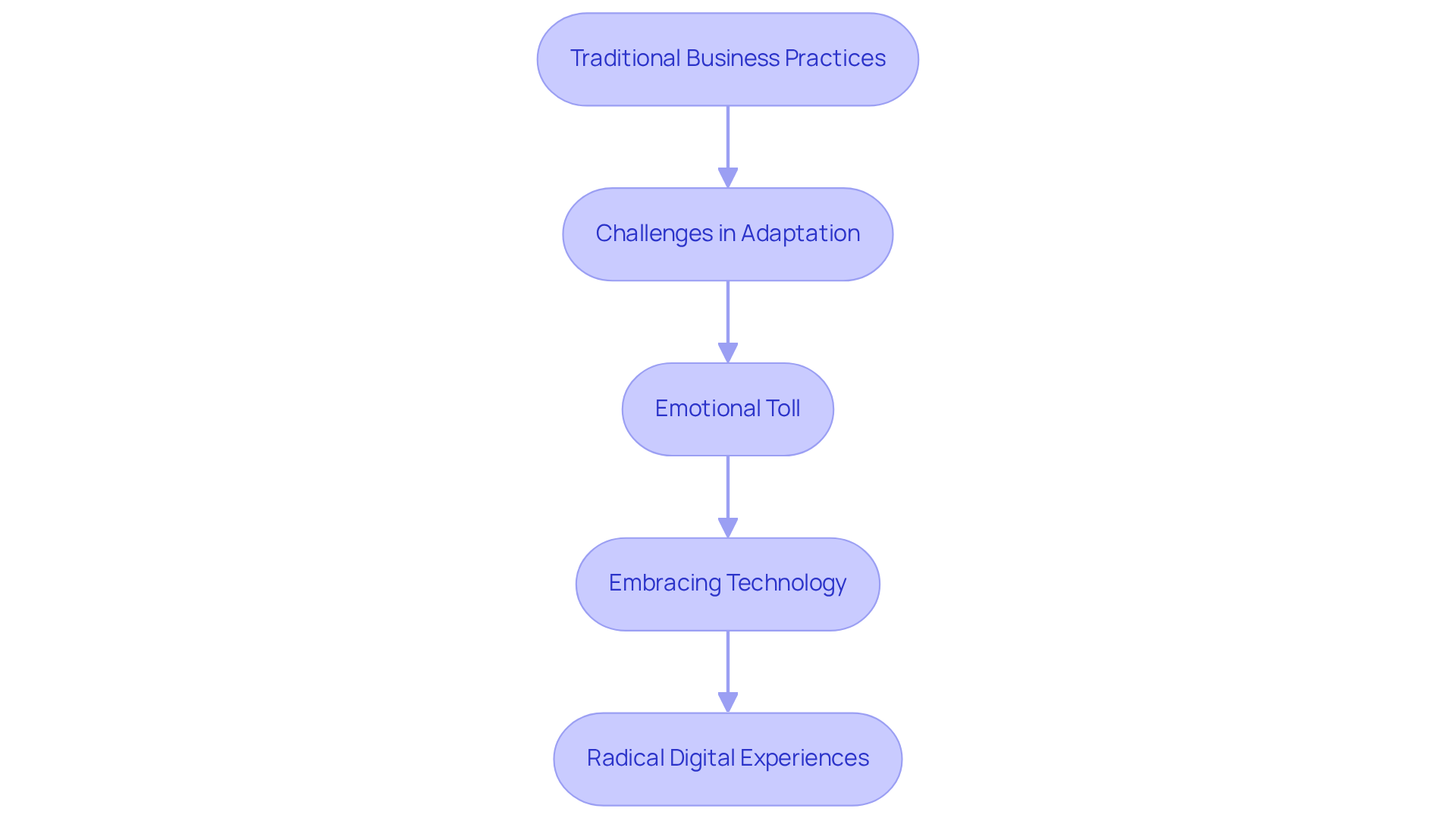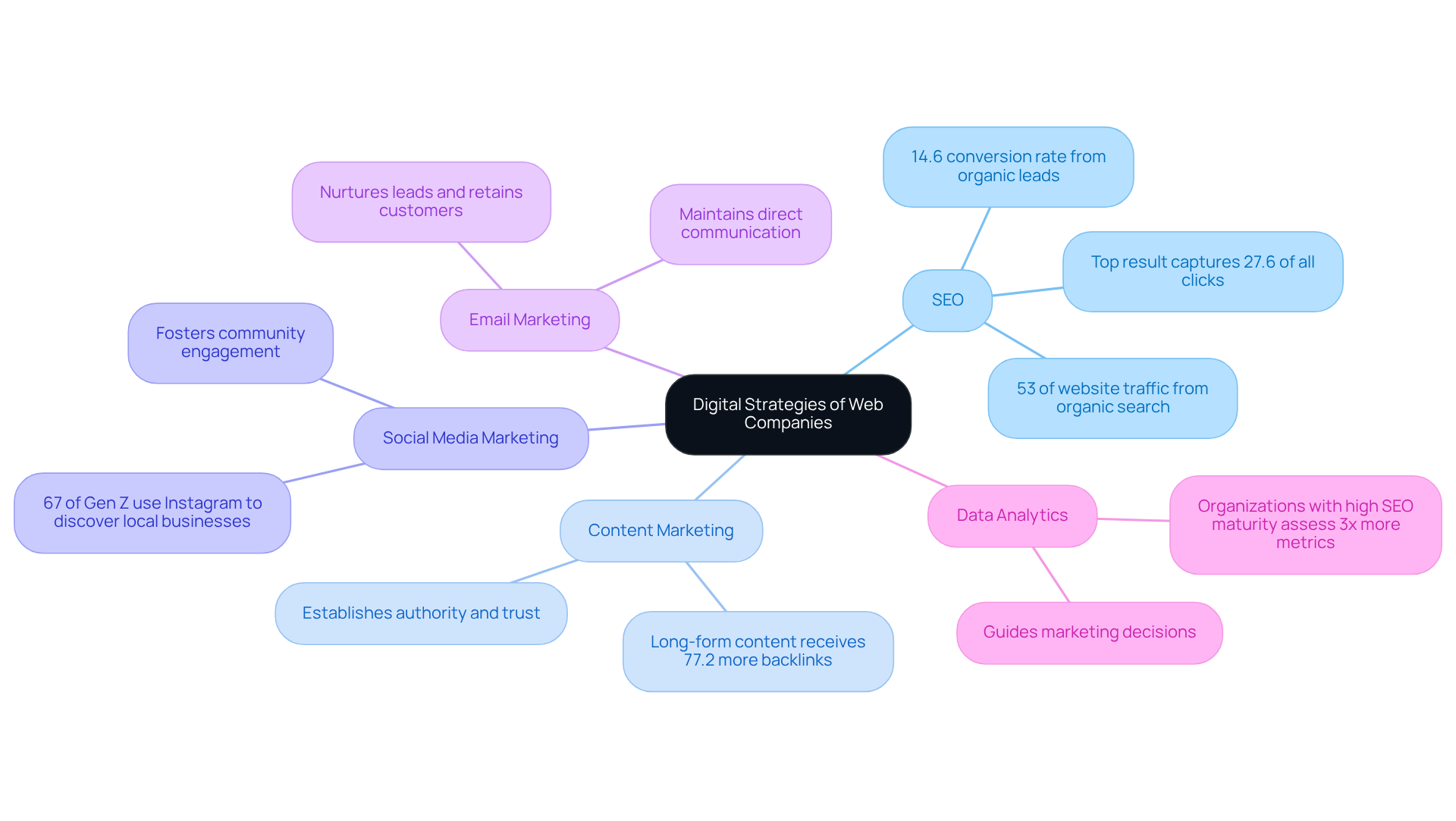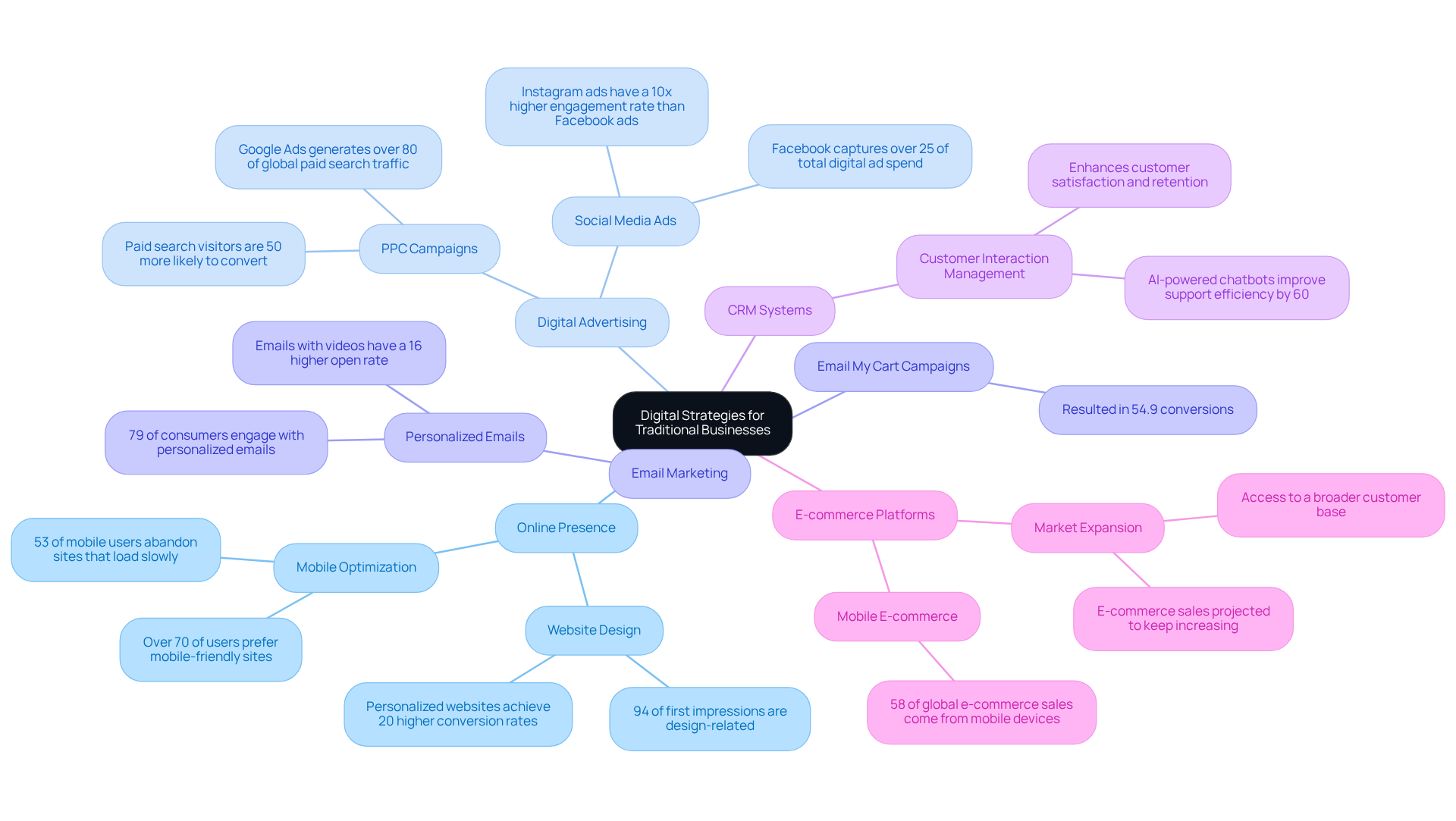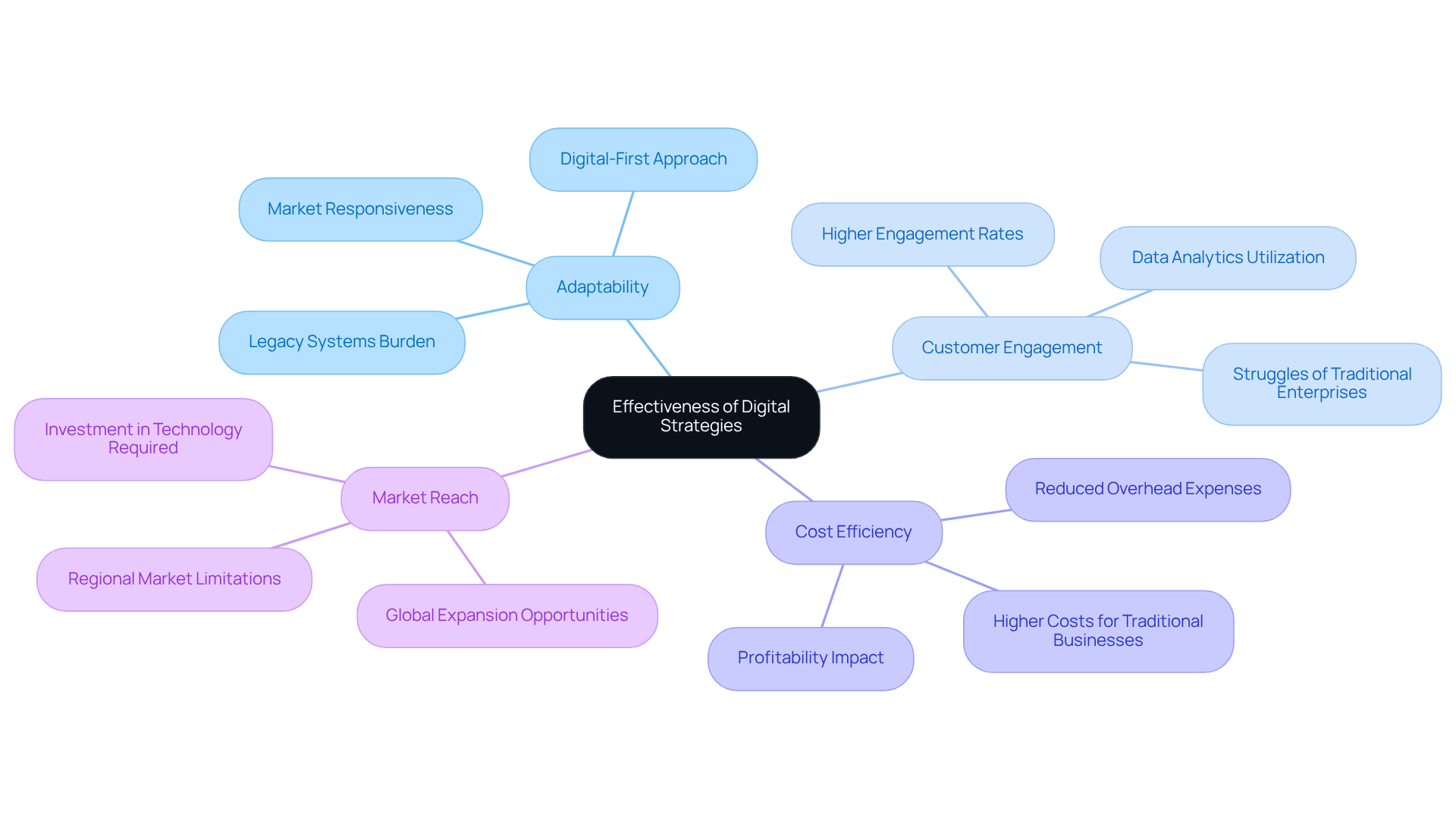Overview
In today's rapidly evolving digital landscape, many traditional businesses find themselves struggling to adapt. This challenge can feel overwhelming, especially when compared to web companies that seem to thrive in this environment. It's important to recognize the pain points that arise from this disparity—issues like customer engagement, cost efficiency, and market reach can weigh heavily on those who are trying to transition to digital methods. Traditional businesses often face significant hurdles in embracing these changes, which can lead to feelings of frustration and uncertainty.
However, there is hope. Web companies excel in leveraging advanced strategies that not only enhance their adaptability but also foster deeper connections with customers. By sharing their experiences and insights, these companies illuminate a path forward for traditional businesses. The journey may be difficult, but with the right support and strategies, it's entirely possible to thrive in this new digital era. Together, we can explore these strategies and find solutions that nurture growth and success for all businesses navigating this landscape.
Introduction
In a world where digital presence can make or break a business, traditional enterprises face a pressing challenge: the urgent need to adapt. As they hold tightly to time-honored practices, many find themselves feeling overwhelmed by the rapid evolution of digital strategies that web companies have embraced so seamlessly.
This article explores the contrasting approaches of web companies and traditional businesses, shedding light on the advantages of innovative digital marketing techniques while compassionately addressing the challenges faced by those rooted in conventional methods.
How can traditional businesses bridge this gap effectively? Together, we can explore how to harness the power of digital transformation to thrive in an increasingly online marketplace.
Defining Web Companies and Traditional Businesses
In today's rapidly evolving landscape, many traditional businesses find themselves at a crossroads. They often rely on physical locations and conventional marketing techniques, which can leave them feeling overwhelmed in a digital-first world. This struggle is not just a business challenge; it can also feel like a personal setback, as adapting to new methods can be daunting. As these enterprises prioritize local markets, they may discover that the online environment is changing faster than they can keep up. This can lead to feelings of frustration and uncertainty.
At RNO1, we understand these challenges deeply. We recognize the emotional toll that comes with navigating this shift. That's why we are here to guide modern brands in creating Radical Digital Experiences™ across various platforms. Through innovative performance marketing strategies, we empower eCommerce growth with targeted campaigns and data-driven insights. Our approach is designed to nurture and support your journey, helping you connect with a worldwide audience while alleviating the stress of digital transformation.
By embracing technology and advanced digital marketing, we can work together to bridge the gap between traditional practices and modern demands. Understanding these differences is not just about ; it's about fostering a sense of community and support as you navigate the complexities of the online world. Let’s embark on this journey together, transforming challenges into opportunities for growth and connection.

Digital Strategies of Web Companies
In today's competitive environment, web companies often face the challenge of effectively reaching their audience and making an impact. This can be a source of stress, as the digital landscape is constantly evolving. However, there are nurturing strategies that can help you navigate these challenges and thrive.
- Search Engine Optimization (SEO) is a crucial aspect of enhancing your website's visibility on search engines. Did you know that over 53% of all website traffic comes from organic search? By focusing on SEO, you not only attract organic traffic but also significantly boost your conversion rates—averaging 14.6% for organic leads compared to just 1.7% for traditional methods. This is a powerful way to grow your business and reach your goals.
- Content Marketing is another essential strategy. By creating valuable and relevant content, you can engage users and establish authority within your niche. Long-form content, for example, tends to receive 77.2% more backlinks than shorter articles, enhancing its effectiveness in driving traffic and improving SEO rankings. This approach not only helps you connect with your audience but also builds trust and credibility.
- Social Media Marketing plays a vital role in building brand awareness and fostering community engagement. Platforms like Instagram, Facebook, and Twitter can be leveraged to reach younger audiences, with 67% of Gen Z using Instagram to discover local businesses. Embracing social media can create a sense of community around your brand, inviting interaction and connection.
- Email Marketing is essential for nurturing leads and retaining customers. Targeted email campaigns allow you to maintain direct communication with your audience, fostering engagement and conversions. This ongoing dialogue can be incredibly beneficial for with your customers.
- Data Analytics is another powerful tool that enables you to understand customer behavior and optimize your marketing efforts. Organizations with advanced SEO maturity are more likely to assess and document three times as many SEO metrics, leading to better-informed plans. This data-driven approach can guide your decisions and help your business grow.
By embracing these strategies, web companies can adapt to market shifts and changing customer preferences, ensuring ongoing growth and a competitive edge in the digital landscape. Remember, you are not alone in this journey; there are supportive solutions available to help you succeed.

Digital Strategies of Traditional Businesses
In today’s rapidly evolving market, conventional enterprises face the pressing challenge of maintaining competitiveness. Many are beginning to realize the importance of implementing online strategies for web companies, yet the journey can feel daunting. Without a , web companies risk losing touch with their customers and falling behind in an increasingly digital world.
For web companies, establishing a robust online presence through user-friendly websites is essential. A well-designed site not only showcases products and services but also significantly influences customer perceptions, with 94% of first impressions related to design. Imagine a potential customer visiting a beautifully crafted website that reflects your brand's values; it can create an immediate connection.
Digital advertising also plays a crucial role for web companies in reaching wider audiences. Utilizing pay-per-click (PPC) campaigns and social media ads can help organizations connect with potential customers efficiently. In fact, digital advertising expenditure by conventional web companies is anticipated to increase considerably by 2025, with mobile advertising accounting for over 70% of digital ad allocations. This shift can open doors to new opportunities and foster growth.
Moreover, implementing targeted email marketing strategies can enhance customer communication. Personalized emails have been shown to engage 79% of consumers, fostering loyalty and driving conversions. Think of how a simple, heartfelt message can make a customer feel valued and appreciated.
Utilizing Customer Relationship Management (CRM) systems allows organizations to manage customer interactions and data efficiently, enhancing customer satisfaction and retention. When customers feel heard and understood, they are more likely to remain loyal.
Transitioning to online sales platforms enables web companies to expand their market reach beyond local boundaries. With e-commerce sales projected to keep increasing, companies that adopt this change can access a broader customer base. It’s a chance to grow and thrive in a way that was previously unimaginable.
Despite the challenges conventional enterprises encounter in fully adopting online methods, those that successfully implement these approaches often experience improved customer interaction and significant sales increases. As marketing experts observe, this transformation journey is vital for survival and achievement in an increasingly online marketplace. Remember, you are not alone in this journey—support and resources are available to help guide you through the process.

Comparative Analysis: Effectiveness of Digital Strategies
When we consider the , it's clear that several critical factors are at play.
- Adaptability is a significant concern. Web companies often excel in their ability to respond to market changes, thanks to their digital-first approach. In contrast, traditional businesses can feel burdened by legacy systems, which may prevent them from swiftly adapting to evolving market demands. This can be frustrating and disheartening for those trying to keep pace with a rapidly changing environment.
- Customer Engagement is another area where online businesses excel. Their digital strategies typically lead to higher engagement rates, as they leverage data analytics to tailor experiences that resonate with customer preferences. While traditional enterprises are making strides, they often find themselves struggling to achieve similar levels of connection with their audience. This gap can leave many feeling overwhelmed and unsure of how to bridge it.
- Cost Efficiency also plays a crucial role. The operational framework of online businesses allows for reduced overhead expenses tied to virtual operations, which can be a breath of fresh air. On the other hand, conventional enterprises often face higher costs associated with maintaining physical locations, impacting their overall profitability. This financial strain can add to the stress of running a business.
- Finally, consider Market Reach. Online enterprises can expand their operations globally with relative ease, utilizing digital platforms to connect with a wider audience. In contrast, traditional businesses may find themselves confined to regional markets, often requiring significant investment in technology to broaden their reach. This limitation can be discouraging for those eager to grow.
In summary, while traditional businesses are increasingly embracing digital strategies, web companies often show greater effectiveness in utilizing these strategies to foster growth and enhance customer engagement. It's essential to recognize these differences and understand that support is available. By learning from the successes of web companies, traditional businesses can discover pathways to adapt and thrive in this digital age.

Conclusion
The landscape of business is undergoing a profound transformation, and it’s heartening to see web companies leading the charge in adopting innovative digital strategies that enhance customer engagement and operational efficiency. Yet, traditional businesses, while increasingly aware of the necessity to pivot towards digital methods, often grapple with the challenges of adaptation. This struggle is common, and understanding these differences is crucial for both types of enterprises as they navigate the complexities of the modern marketplace.
Key insights reveal that web companies excel in areas such as:
- Adaptability
- Customer engagement
- Cost efficiency
- Market reach
Through strategies like SEO, content marketing, and social media engagement, these businesses effectively connect with a global audience. In contrast, traditional businesses face hurdles related to:
- Legacy systems
- Higher operational costs
- Limited reach
These challenges can hinder their growth potential. It’s important to recognize that these challenges do not define their future. By learning from the successes of web companies and embracing digital transformation, traditional enterprises can unlock new opportunities for engagement and expansion.
Ultimately, the ability to adapt to the digital age is not just beneficial; it is essential for survival in an increasingly competitive environment. It’s vital for businesses to recognize that support and resources are available to aid in this transition. By fostering a culture of innovation and collaboration, both web companies and traditional businesses can thrive together, transforming challenges into opportunities for lasting success. We invite you to share your experiences and thoughts as we embark on this journey together, nurturing a community that supports each other in navigating the future of business.
Frequently Asked Questions
What challenges do traditional businesses face in a digital-first world?
Traditional businesses often struggle with relying on physical locations and conventional marketing techniques, which can leave them feeling overwhelmed as the online environment evolves rapidly.
How can adapting to new digital methods affect traditional businesses personally?
Adapting to new methods can feel daunting, leading to feelings of frustration and uncertainty, as it may seem like a personal setback for those involved in the business.
What is RNO1's role in helping traditional businesses?
RNO1 guides modern brands in creating Radical Digital Experiences™ through innovative performance marketing strategies, empowering eCommerce growth with targeted campaigns and data-driven insights.
How does RNO1 support businesses in their digital transformation journey?
RNO1's approach is designed to nurture and support businesses, helping them connect with a worldwide audience while alleviating the stress associated with digital transformation.
Why is it important for traditional businesses to embrace technology and digital marketing?
Embracing technology and advanced digital marketing helps bridge the gap between traditional practices and modern demands, fostering community and support as businesses navigate the complexities of the online world.
What is the ultimate goal of RNO1 in working with traditional businesses?
The ultimate goal is to transform challenges into opportunities for growth and connection, enabling businesses to thrive in a digital landscape.




